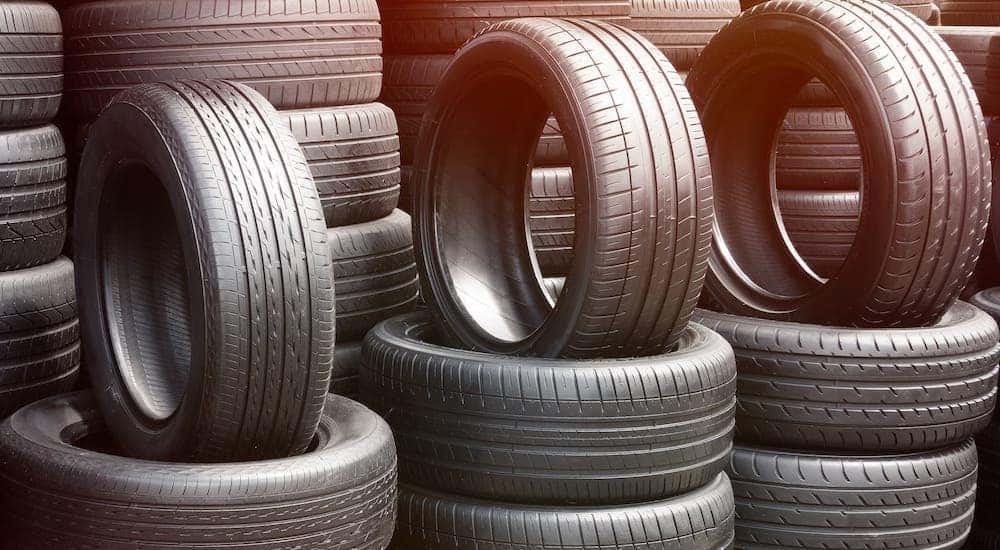Tire Service: Understanding Tire Pressure Surveillance Systems
Understanding Tire Stress Surveillance Solutions (TPMS) is a vital aspect of preserving optimum car efficiency and safety and security on the road. With innovations in automotive innovation, TPMS has actually become a basic attribute in modern automobiles, giving real-time information on tire pressure degrees.

Importance of TPMS
The value of Tire Pressure Tracking Solutions (TPMS) depends on their capacity to boost vehicle security and efficiency with real-time surveillance of tire stress degrees. Keeping the correct tire pressure is essential for making sure optimal handling, braking, and general security of an automobile. TPMS gives vehicle drivers with prompt comments on any kind of underinflated or overinflated tires, enabling for timely modifications to be made.
Parts of TPMS
Sensing units are typically located in the tire valve stem or affixed to the wheel setting up, where they gauge tire pressure and transmit information to the control component. Some progressed TPMS designs additionally present the real tire stress analyses for each tire, supplying drivers with real-time info to make sure ideal tire performance and safety. By keeping track of tire stress constantly, TPMS assists stop mishaps, minimizes tire wear, and improves fuel efficiency, making it an essential component for vehicle safety and security and performance. tire shop morris.
Types of TPMS

On the other hand, indirect TPMS depends on the car's wheel rate sensors to keep track of tire stress. This system finds underinflation by contrasting the rotational rates of the wheels. Indirect TPMS is less costly than direct TPMS, as it utilizes existing sensors within the vehicle.
While straight TPMS provides much more exact analyses, indirect TPMS is simpler in layout and typically requires less maintenance. Both systems have their benefits and restrictions, and the choice in between them commonly depends on aspects such as price, vehicle make, and individual choice. Comprehending the distinctions in between these 2 kinds of TPMS can aid lorry proprietors make notified decisions pertaining to tire upkeep and safety and security.
TPMS Maintenance Tips
Reliable maintenance of TPMS is important for making sure optimal efficiency and safety of your vehicle. Frequently inspecting the TPMS sensors for any kind of damage or deterioration is crucial. Ensure that the sensing units are clean and complimentary from debris that can conflict with their performance. In addition, it is recommended have a peek here to inspect the sensing unit batteries occasionally and change them as needed to ensure accurate readings. Conduct routine examine the tire pressure degrees and contrast them with the TPMS analyses to ensure they correspond. Alter the system complying with the maker's guidelines if there are any kind of discrepancies. During tire turning or substitute, make certain that the TPMS elements are dealt with meticulously to prevent any potential damages. If the TPMS cautioning light brightens on the dashboard, deal with the problem immediately by inspecting the tire stress and the overall system for any kind of faults. By adhering to these upkeep ideas, you can extend the life expectancy of your TPMS and enhance the safety and security of your driving experience.
Benefits of Appropriate Tire Stress
Maintaining proper tire stress, as emphasized in TPMS Maintenance Tips, is continue reading this vital for enjoying the countless advantages related to optimum tire stress degrees. Among the primary advantages of maintaining the appropriate tire stress is improved fuel effectiveness. When tires are properly blown up, there is less rolling resistance, bring about far better fuel economic climate. Furthermore, correct tire pressure makes certain also tire wear, prolonging the life-span of the tires and advertising safer driving conditions. With the appropriate tire stress, vehicles additionally have better handling and grip, especially in unfavorable climate condition. This can enhance total driving efficiency and safety for the motorist and passengers. Additionally, keeping optimal tire stress can add to a smoother and much more comfy experience by minimizing vibrations and sound created by underinflated tires. Finally, the advantages of correct tire pressure surpass just tire durability; they incorporate improved gas performance, improved security, far better automobile efficiency, and total driving convenience.
Verdict
In final thought, comprehending tire stress tracking systems (TPMS) is critical for preserving optimal tire pressure and ensuring automobile safety and security. By acknowledging the relevance of TPMS, imp source being acquainted with its components, knowing the various types available, adhering to correct upkeep tips, and realizing the benefits of keeping appropriate tire stress, chauffeurs can enhance their driving experience and lengthen the lifespan of their tires. Correct tire stress is essential to safe and effective lorry operation.
